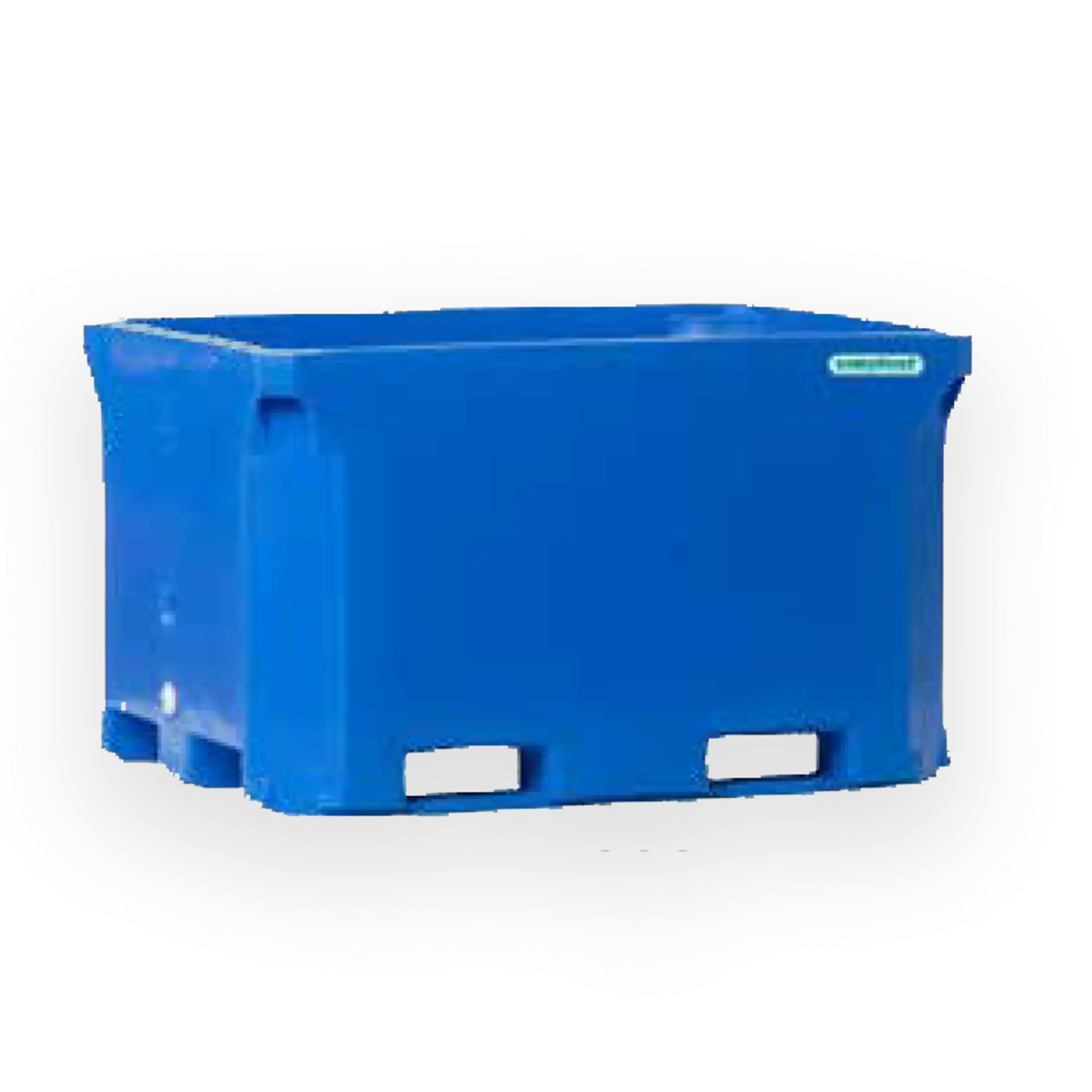The Duty of Bulk Plastic Containers in Effective Recycling Practices and Sustainability
Mass plastic containers are indispensable to modern reusing efforts. Their design boosts the efficiency of material collection and transport, adding to sustainability goals. These containers not just maximize area yet likewise assist in checking contamination levels. Their application is not without obstacles. Understanding the full range of their effect discloses a complex partnership between logistics and environmental duty that warrants more exploration.
Understanding Bulk Plastic Containers
Mass plastic containers act as an essential component in various markets, promoting the storage space and transport of products. These containers are generally made from durable materials such as high-density polyethylene (HDPE) or polypropylene, which offer durability and resistance to environmental variables. Their style frequently includes functions like stackability and modularity, permitting reliable use area during both storage space and transit.
Industries such as farming, food handling, and producing regularly utilize mass plastic containers as a result of their light-weight nature and simplicity of handling. The containers come in different sizes and arrangements, satisfying the details demands of various items. Their adaptability prolongs beyond mere performance; they can additionally be personalized with covers, takes care of, and identifying choices to improve usability - plastic bulk containers. As an outcome, mass plastic containers play a critical role in maximizing logistics and supply chain procedures across several markets, thereby adding to total efficiency and cost-effectiveness
Benefits of Utilizing Bulk Plastic Containers in Recycling
When organizations focus on reusing initiatives, the utilization of mass plastic containers substantially boosts the performance of the procedure. These containers are developed to optimize space, enabling the storage and transport of larger amounts of recyclable products. This causes fewer journeys to recycling centers, consequently reducing fuel consumption and connected discharges.
Furthermore, mass plastic containers are immune and resilient to numerous environmental elements, making sure that materials remain shielded throughout handling and transportation. Their light-weight layout even more adds to lower transportation prices.
The uniformity of these containers assists in far better sorting and handling of recyclable products, which can enhance total recycling prices. Organizations that embrace bulk plastic containers additionally show a dedication to sustainability, favorably affecting their brand name picture. Ultimately, these advantages not only streamline reusing practices however additionally contribute to broader environmental goals
Just How Mass Plastic Containers Facilitate Product Collection
Reliable product collection is substantially boosted by the usage of mass plastic containers, as they offer a structured and efficient solution for gathering recyclable things. These containers are designed to fit large quantities of products, which streamlines the sorting and storage process. Their stackable layout makes best use of space utilization, making it less complicated for centers to organize recyclables without clutter.
In enhancement, mass plastic containers are long lasting and weather-resistant, permitting for outdoor positioning without destruction. This durability assures that products continue to be safeguarded until they are collected for processing.

The uniformity in shapes and size of these containers assists in standardization throughout collection points, enabling far better monitoring of recyclable quantities. Furthermore, their clear nature enables for easy exposure of contents, helping in the surveillance of contamination levels and assuring that just suitable products are accumulated. Generally, mass plastic containers play a vital function in improving the material collection procedure, therefore advertising reliable reusing techniques.
Transportation Effectiveness and Environmental Impact
Transport effectiveness plays a vital duty in the recycling procedure, especially via the optimization of load capacity in mass plastic containers. By taking full advantage of the volume of product transported, companies can significantly minimize the variety of journeys required, consequently lessening their carbon footprint. This strategy not just improves functional efficiency yet additionally adds to a lot more sustainable environmental practices.

Optimizing Load Ability
Although maximizing load ability is frequently neglected, it plays a crucial role in enhancing transport effectiveness and decreasing ecological impact in reusing techniques. By making best use of the quantity that bulk plastic containers can hold, recycling operations can lower the number of trips needed for transportation. This not only reduces fuel consumption however also decreases the wear and tear on lorries. Efficient tons monitoring allows centers to use area effectively, guaranteeing that each transportation cycle is as efficient as possible. Additionally, well-optimized lots can lead to far better settlements with logistics providers, potentially minimizing overall expenses. Eventually, enhancing load ability adds to a much more lasting recycling system by promoting efficient resource usage and decreasing waste generated throughout transport.
Lowering Carbon Impact
As reusing operations venture to decrease their environmental influence, lowering the carbon footprint connected with transport becomes a critical goal. Mass plastic containers play a critical function in attaining this purpose by enhancing load performance and maximizing logistics. Their lightweight yet resilient design enables maximum cargo room application, lowering the number of journeys needed to deliver products. By combining shipments, reusing facilities can decrease gas consumption and greenhouse gas exhausts. In this website enhancement, purposefully locating recycling facilities reduces transport distances, furthermore decreasing carbon outputs. Moreover, using fuel-efficient vehicles and alternate power sources improves general sustainability. By incorporating these techniques, the reusing sector can appreciably reduce its carbon footprint, adding to a more sustainable future.
Challenges in using Bulk Plastic Containers

Contamination Problems
Contamination problems represent a substantial difficulty in the reliable use mass plastic containers within recycling practices. These containers usually accumulate deposits from previous components, leading to blended materials that can prevent the recycling process. Pollutants such as food waste, chemicals, or non-recyclable products can compromise the integrity of the whole set, causing raised disposal costs and decreased reusing rates. Additionally, improper cleaning or sorting can exacerbate these concerns, making it tough for recycling centers to refine products efficiently. The existence of impurities not only affects the quality of recycled products however additionally weakens the total sustainability efforts targeted at reducing plastic waste. Resolving these contamination difficulties is vital for improving the efficacy of bulk plastic container recycling.
Recycling Infrastructure Limitations
Inadequacy in recycling infrastructure positions considerable obstacles for the effective administration of bulk plastic containers. Several recycling centers lack the capacity to refine huge volumes of these containers efficiently, resulting in raised costs and hold-ups. Insufficient arranging innovations typically lead to contamination, as bulk containers may be mixed with other products, complicating the recycling process. Limited transportation options also hinder the motion of mass plastic containers to appropriate recycling centers, causing boosted land fill waste. In addition, a lack of standardized procedures for bulk container recycling produces complication amongst companies and customers, additionally making complex efforts to advertise sustainability. Resolving these facilities constraints is crucial to improve recycling techniques and make best use of the potential of mass plastic containers in a round economic climate.
Finest Practices for Executing Bulk Plastic Containers
When organizations think about implementing bulk plastic containers in their reusing methods, they ought to prioritize a strategic strategy that enhances performance and decreases contamination risks. First, choosing the proper container size and kind is necessary to accommodate the volume of materials being refined. Organizations needs to additionally develop clear labeling and signs to guide individuals on correct disposal techniques, minimizing confusion and errors. Normal training sessions for staff can better enhance these techniques, making certain everyone comprehends their duties in maintaining reusing honesty.
Additionally, companies must apply a routine upkeep timetable to evaluate and clean containers, stopping the build-up of impurities. Partnering with local recycling facilities can also streamline the collection process, guaranteeing that materials are successfully refined. Companies need to keep track of and assess their recycling metrics, utilizing this information to improve techniques over time and promote continual renovation in their sustainability efforts.
The Future of Mass Plastic Containers in Sustainable Practices
As organizations increasingly prioritize sustainability, the duty of mass plastic containers in reusing methods is set to progress significantly. Advancements in materials science are resulting in the development of naturally degradable and recyclable choices, enhancing the ecological advantages of bulk plastic containers. Additionally, the implementation of closed-loop systems will enable easier collection and repurposing of these containers, reducing waste and source consumption.
Technological improvements, such as wise tracking systems, will make it possible for business to monitor the lifecycle of mass containers, boosting efficiency in reusing procedures. As consumer need for sustainable techniques expands, companies will likely adopt bulk plastic containers developed for reuse and lasting worth. Collaboration between sectors and federal governments will certainly foster the establishment of standard recycling protocols, guaranteeing that bulk containers are properly integrated into more comprehensive sustainability efforts. In general, the future of mass plastic containers shows up encouraging, with considerable potential for adding link to a circular economic climate.
Frequently Asked Inquiries
Just How Are Mass Plastic Containers Made and What Products Are Utilized?
Bulk plastic containers are see this typically made from high-density polyethylene (HDPE) or polypropylene (PP) These materials are refined through injection molding or strike molding strategies, causing durable, lightweight containers ideal for numerous storage and transport demands.
Can Bulk Plastic Containers Be Recycled Numerous Times Before Recycling?
Yes, bulk plastic containers can be recycled numerous times before recycling. Their toughness and style enable repeated usage in different applications, promoting sustainability and source performance while decreasing the need for brand-new containers.

What Qualifications Exist for Mass Plastic Containers in Recycling?
Different qualifications for mass plastic containers consist of the Recycling Collaboration's accreditation, the Cradle to Cradle Licensed ™ standard, and the Lasting Product packaging Coalition's guidelines, ensuring containers satisfy particular ecological and recyclability requirements for effective recycling.
Just How Do Bulk Plastic Containers Contrast to Other Recycling Storage Space Options?
Mass plastic containers supply better durability and ability compared to other reusing storage space alternatives, minimizing the danger of contamination and helping with efficient transportation. Their design sustains much better company, improving general efficiency in recycling procedures.
What Is the Life expectancy of a Bulk Plastic Container in Recycling Processes?
The lifespan of a mass plastic container in reusing processes generally ranges from 5 to 10 years, depending on use, material high quality, and ecological conditions, permitting numerous cycles of use prior to ultimate disposal or recycling.
When organizations focus on recycling efforts, the application of bulk plastic containers considerably enhances the efficiency of the procedure. Transportation effectiveness plays a vital duty in the recycling procedure, specifically with the optimization of tons capability in bulk plastic containers. The usage of bulk plastic containers in reusing techniques encounters substantial challenges, especially concerning contamination problems and constraints within reusing infrastructure. Contamination issues represent a substantial obstacle in the effective use of bulk plastic containers within recycling methods. When organizations think about applying mass plastic containers in their recycling practices, they need to prioritize a calculated method that improves efficiency and lowers contamination threats.